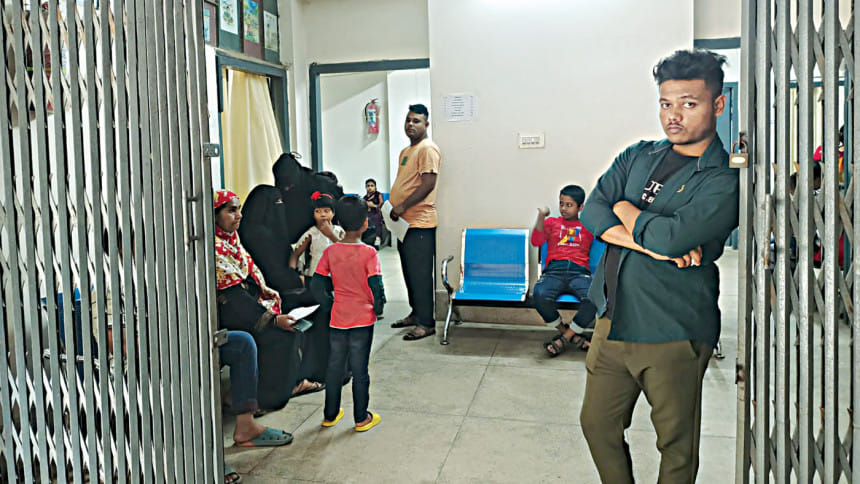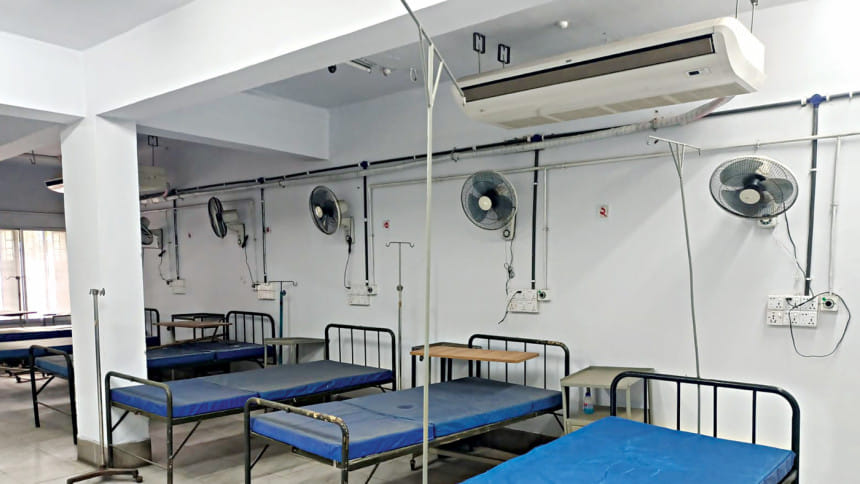ALL three hospitals run by DSCC: Limping along due to shortage of manpower, limited resources

Acute manpower shortages, underutilised facilities, and the plights of patients -- these are the things this correspondent observed while visiting all three hospitals under Dhaka South City Corporation.
These hospitals serve as a crucial lifeline for the lower-middle class and impoverished communities, offering essential medical services at affordable rates.
However, the reality is that these institutions are now limping along, struggling under the weight of neglect and mismanagement.

Patients, many of whom rely on these hospitals as their sole recourse for treatment, often find themselves waiting for hours, even days, for attention, while doctors and nurses are stretched too thin to offer the level of care that's desperately needed.
At one of the hospitals, Sabera Khatun, a frail woman, clutching her young son in her arms, described her experiences: "I've been here for over 12 hours, waiting for a doctor. My child is burning with fever, but no one is around to help."
Her words echoed the frustration felt by many others who have no other choice but to endure the long wait to receive care.
A senior doctor at one of the facilities, seeking anonymity, shared, "We are fighting an uphill battle. The number of patients keeps growing, but we're working with half the manpower we need."
DHAKA MOHANAGAR GENERAL HOSPITAL
Dhaka Mohanagar General Hospital, established in 1989, has 150 beds and facilities for 31 types of diagnostic tests. Despite the installation of ICU units and high-flow oxygen equipment during the Covid-19 pandemic, these facilities remain unused due to a lack of personnel.
The hospital provides diagnostic tests at Tk 20-600 and offers 45 types of medication free of charge.
On average, 400 outpatients are treated daily, while only 5-6 patients are admitted.
Badsha Mia, a patient, said, "As a poor man, I can't afford treatment at big hospitals, so I come here. But there are very few doctors, so it takes a long time to get treatment."
The hospital's surgery department has been non-functional since 2015 due to the departure of a consultant. While gynaecological surgeries continue, high-dependency unit (HDU) beds installed in 2021 remain unused.
The hospital's director, Dr Ammata Noor Wahida Sultana, said, "We have written to the health ministry and DGHS several times requesting staff but to no avail."
Currently, only 17 of the required 32 doctors are employed, leaving 15 positions vacant. Most doctors focus on outpatient services, disrupting care for admitted patients. "Since 2015, the hospital has had no surgery consultants, effectively reducing it to a 100-bed facility," Dr Sultana said.
DHAKA METROPOLITAN CHILDREN'S HOSPITAL
Established in 1990, the Dhaka Metropolitan Children's Hospital serves 200-250 children daily but shuts its doors by 8:00pm due to staff shortages. Critical patients are referred elsewhere, and the surgery department has been closed for over a decade.
Since 2012, the paediatric surgery department has remained locked due to the absence of a surgical consultant, leaving 40 of the hospital's 100 beds unused. The physiotherapy department operates only once a week, relying on an external physiotherapist.
The hospital employs six consultant doctors and 13 medical officers, but only two consultants and seven medical officers are currently available.
Patients from low-income families crowd the outpatient department for affordable care.
Hazera Khatun, a slum resident from Lalbagh, said, "Getting treatment here costs much less than other hospitals. That's why daily wage earners like us come here."
The hospital's director, Salina Akhter, said, "We have written to authorities. They assured us that the problem would be resolved soon. The manpower crisis is why the night shift remains non-operational."
NAZIRABAZAR MATRI SADAN
Nazirabazar Matri Sadan, established in 2002 to provide maternal healthcare, faces critical manpower and infrastructure shortages.
Patients complain that outpatient services, scheduled to operate until 2:30pm, often close by 1:30pm.
Located on Bangashal New Road, the hospital is surrounded by narrow, congested streets, exacerbating access issues.
Inside, the six-story building has sparse activity.
The service centre on the second floor had one nurse on duty but no patients during a morning visit, while the third-floor wards were underused.
Talking to this correspondent, service seekers expressed frustration.
Rashida Khatun, from Mokim Bazar, said, "Doctors are not always available. Even when they are, basic medicines are missing. How can a maternity hospital lack essential medicines for expectant mothers?"
Faruk Ahmed, who sought care for his wife but left disappointed, said, "The hospital has failed to serve the community effectively. Despite having facilities, the lack of staff and medicines erodes trust."
Deputy Director Sathi Khanam acknowledged the challenges. "We have acquired an ultrasound machine and can conduct blood-type tests, but a lack of trained personnel prevents full utilisation. The shortage of doctors is another pressing issue," she said.

 For all latest news, follow The Daily Star's Google News channel.
For all latest news, follow The Daily Star's Google News channel. 



Comments